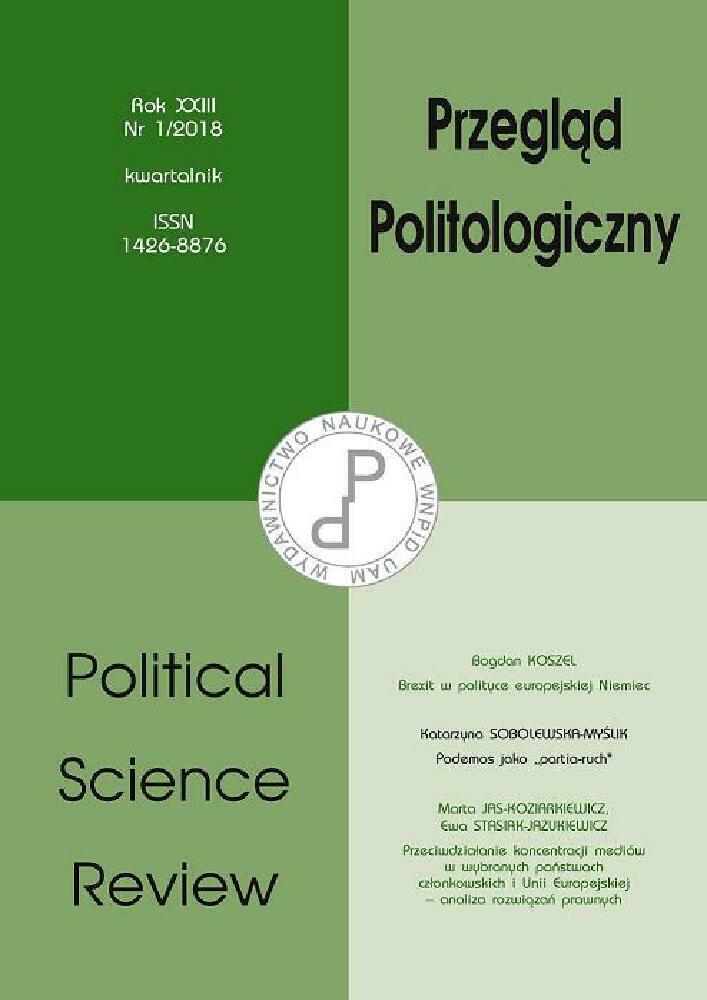Abstrakt
Higher education policy is an element of soft power in the international politics of the PRC. This has become possible because, for two decades, universities in China have been developing and undergoing profound changes. PRC authorities have set ambitious goals for their universities, e.g. making some of the universities top higher education institutions worldwide. Universities in China are abandoning the “copy-paste” pattern, developing their own technological innovations, and consistently raising their position in international rankings. Development goals set for Chinese universities are connected with the global economic expansion of the PRC. The scientific diplomacy of China is primarily executed through the Confucius Institutes network. European Union universities are a strategic goal of this policy as they possess the resources, practices and customs China needs to strengthen its universities. The paper analyzes selected issues of employing higher education policy as a soft power in Chinese diplomacy.
Bibliografia
Bingran D. (2007), Promoting mutual understanding, w: China–EU. A common future, red. S. Crossick, E. Reuter, World Scientific, New Jersey.
Bingran D. (2008), European studies in China, w: China-Europe Relations: Perceptions, Policies and Prospects, red. D. Shambaugh, E, Sandschneider, Z. Hong, Routledge, London.
Hartig F. (2016), Chinese Public Diplomacy. The rise of the Confucius Institute, Routledge, London.
Gaspers, J. (2017), Niemcy, w: Chiński projekt Nowego Jedwabnego Szlaku. Retoryka a rzeczywistość, red. K. Iwanek, O. Pietrewicz, ASW, Warszawa.
Glasser B., Murphy M. (2009), Soft Power with Chinese Characteristic, w: Chinese Soft Power and its Implication for the United States, red. C. MacGiffert, Center for Strategic and International Studies, Washington.
Gillman O. (2015), More Chinese students at UK universities than from the whole of the EU, „Dailymail”, 16 stycznia.
Kennedy S. (2017), Made in China 2015, Center for Strategic and International Studies, Washington.
Komisja Europejska (2015), EU-China 2020 Strategic Agenda for Cooperation, Brussels.
Lima T. (2017), International partnership: what next? Perspective from a UK university, prezentacja, Kings College, London.
Miłoszewska D., Potocki R. (2010), Rola soft power w środowisku międzynarodowym, Repozytorium Uniwersytetu im. Adama Mickiewicza.
Ministerstwo Edukacji ChRL (2014), List of Chinese Colleges and Universities in 2014, http://en.moe.gov.cn/Resources/Directories/201506/t20150626_191383.html.
Ministerstwo Edukacji ChRL (2015), Number of Non-government schools by Types and Levels, http://en.moe.gov.cn/Resources/Statistics/edu_stat_2015/2015_en01/201610/t20161012_284508.html.
Nye J. (2007), Soft power. Jak osiągnąć sukces w polityce światowej, WAiP, Warszawa.
OECD (2017), Education at Glance 2016, Paris.
Paradise J. (2009), China and International Harmony: The Role of the Confucius Institutes in Bolstering Beijing’s Soft Power, „Asian Survey”, nr 49/4.
Parr Ch. (2017), These universities have the best reputation worldwide, World Economic Forum, https://www.weforum.org/agenda/2017/06/universities-best-reputation-china-times-higher-2017/.
Schulte B. (2012), Bildungssystem im Wandel: Elitenbildung, Ungleichheiten, Reformversuche, w: Country Report China, University of Lund, Lund.
A Soft Power 30. A Global Ranking of Soft Power (2017), USC Center on Public Diplomacy, Portland.
Sporek T. (2012), Analiza stosunków handlowych pomiędzy Chińską Republiką Ludową a Unią Europejską, „Studia Ekonomiczne”, nr 21.
Stapleton K. (2017), China now produces twice as many graduates a year as the USA, World Economic Forum, https://www.weforum.org/agenda/2017/04/higher-education-in-china-has-boomed-inthe-last-decade.
Szwabe M. (2005), Rosnące znaczenie Chin – wyzwanie dla Unii Europejskiej, „Wspólnoty Europejskie”, nr 2(159).
Tomaszewska M. (2015), Od Mao Zedonga do Xi Jinpinga. Cechy, cele, kierunki i narzędzia zagranicznej polityki gospodarczej Chińskiej Republiki Ludowej, „Ekonomia Międzynarodowa”, nr 10.
Ustawa Prawo o szkolnictwie wyższym, Dz. U. 2005, Nr 164, poz. 1365.
Xiaobo Wu. (2016), Hukou reform under way in 29 regions across China, „China Daily”, http://www.chinadaily.com.cn/business/2016-04/29/content_24966027.htm.
XJTU News (2015), XJTU Initiated the University Alliance of the New Silk Road, http://en.xjtu.edu.cn/info/1043/1706.htm.
Yang R. (2010), Soft power and higher education: an examination of China’s Confucius Institutes, „Globalisation, Societies and Education”, nr 8/2.
Zenderowski R. (2010), Międzynarodowe stosunki kulturalne, PWN, Warszawa.
